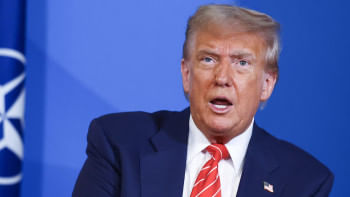Japan steps up
During our prime minister's visit to the G7 Outreach Meeting, a few things became clear about Japanese involvement in Bangladesh. It is good to hear from Premier Abe that Japan will be releasing US$1.5 billion in investments this year. The two major Japanese projects, i.e. the Matarbari coal-based power plant and the Dhaka Metro Rail are on track and there is now talk of a feasibility study to be conducted on the proposed airport at Charjanazat on the far side of the Padma Bridge. From what has been printed in this paper, we understand that the Japanese government, in principle, has agreed to look into the building of a third terminal at Hazraat Shahjalal International Airport by 2019. All this points to a deepening of economic ties between the two countries which can only be good for Bangladesh; as Japan has been one of our best friends since independence.
It is good news for us since besides China and India we can look forward to Japan stepping up investments that will address our core weaknesses, i.e. infrastructure and skills development. Indeed, that Premier Abe has gone on record to talk about "a dedicated railway bridge alongside the existing Bangabandhu Bridge, development of cross-border connectivity and a number of some other projects would be included under the quality infrastructure development initiative," all points to the importance Japan is attaching to a long-term vision for Bangladesh. Looking beyond what Japan is interested in, if we can get Japanese assistance in the areas that have been highlighted by Bangladesh as areas where we need help, i.e. energy efficiency, we could be looking at saving precious natural gas reserves – a fast depleting resource that must be used more efficiently, to last long enough before the coal-based plants come online to form the backbone of Bangladesh's future energy security.
It is high time Bangladeshi policymakers realised the potential of greater Japanese participation in taking our economic interests forward. That Japan believes in putting its money where its mouth is comes through in the Matarbari project where the $3.7 billion will be financed through JICA (Japanese International Cooperation Agency). The government deserves credit in successfully handling the deep sea port construction contract – over which all the major development partners including India, China and trading partner, the United States had been bickering over. This still leaves many areas open for collaboration – from roads and highways, and railway, industry (readymade garments to pharmaceuticals), "skills development" of a largely young population and so on and so forth.
Getting back to the issue of infrastructure, we need to focus on delivery (instead of just public statements). Whilst our premier surely means when she says the government is sincere in ensuring full cooperation to fast-track these projects, our experience tells us that the institutions (like Board of Investment) dedicated to manage foreign investments have been sorely lacking in one area, i.e. getting paperwork done on time. With such lacklustre performance, all the good intentions of the government go nowhere and prospective foreign investors move on to greener pastures. One of the best examples would be the Samsung fiasco a few years ago. Samsung had wanted to invest in a new factory to produce smart phones in the country's Korean EPZ. But thanks to our foot dragging, we lost that opportunity, and as we understand it, Vietnam got that investment. What a complete and utter waste! That factory, which was supposed to be built in Bangladesh, is apparently generating phones that are generating hundreds of millions of dollars in sales annually.
So while the Japanese premier and our premier appear to be committed to moving Bangladesh towards a middle-income country by 2021, we had better get our act together on critical issues such as land allocation, permits needed by industry for power, etc. and basically reduce lead times to get a project up and running. "Time is money" as the saying goes. And until we can stop acting like geriatric pencil pushers when it comes to reducing the cost of doing business, all this talk of mega projects will not be materialising anytime soon.
Having a system that does not prioritise efficiency, we come back to square one in terms of taking critical decisions at the right time and meeting project deadlines – all fundamental prerequisites for any government that wishes to take giant steps on the road to economic development.
At the end of the day, the golden opportunities we have been presented with by development partners like Japan are simply too big to pass on by because we can't get our act together. Failure is simply not an option for a nation of 160 million. We stand at a crossroads where we can choose to move forward or be relegated to the annuls of history as a people who were on the verge of taking off to a new path, but failed because our policymakers failed to step up – like the Japanese have stepped up.
The writer is Assistant Editor, The Daily Star.

 For all latest news, follow The Daily Star's Google News channel.
For all latest news, follow The Daily Star's Google News channel. 








Comments